- Home
- Shirley Jackson
Come Along With Me Page 29
Come Along With Me Read online
Page 29
“All right, then,” Mr. Summers said. “Harry, you got their tickets back?”
Mr. Graves nodded and held up the slips of paper. “Put them in the box, then,” Mr. Summers directed. “Take Bill’s and put it in.”
“I think we ought to start over,” Mrs. Hutchinson said, as quietly as she could. “I tell you it wasn’t fair. You didn’t give him time enough to choose. Everybody saw that.”
Mr. Graves had selected the five slips and put them in the box, and he dropped all the papers but those onto the ground, where the breeze caught them and lifted them off.
“Listen, everybody,” Mrs. Hutchinson was saying to the people around her.
“Ready, Bill?” Mr. Summers asked, and Bill Hutchinson, with one quick glance around at his wife and children, nodded.
“Remember,” Mr. Summers said, “take the slips and keep them folded until each person has taken one. Harry, you help little Dave.” Mr. Graves took the hand of the little boy, who came willingly with him up to the box. “Take a paper out of the box, Davy,” Mr. Summers said. Davy put his hand into the box and laughed. “Take just one paper,” Mr. Summers said. “Harry, you hold it for him.” Mr. Graves took the child’s hand and removed the folded paper from the tight fist and held it while little Dave stood next to him and looked up at him wonderingly.
“Nancy next,” Mr. Summers said. Nancy was twelve, and her school friends breathed heavily as she went forward, switching her skirt, and took a slip daintily from the box. “Bill, Jr.,” Mr. Summers said, and Billy, his face red and his feet overlarge, nearly knocked the box over as he got a paper out. “Tessie,” Mr. Summers said. She hesitated for a minute, looking around defiantly, and then set her lips and went up to the box. She snatched a paper out and held it behind her.
“Bill,” Mr. Summers said, and Bill Hutchinson reached into the box and felt around, bringing his hand out at last with the slip of paper in it.
The crowd was quiet. A girl whispered, “I hope it’s not Nancy,” and the sound of the whisper reached the edges of the crowd.
“It’s not the way it used to be,” Old Man Warner said clearly. “People ain’t the way they used to be.”
“All right,” Mr. Summers said. “Open the papers. Harry, you open little Dave’s.”
Mr. Graves opened the slip of paper and there was a general sigh through the crowd as he held it up and everyone could see that it was blank. Nancy and Bill, Jr., opened theirs at the same time, and both beamed and laughed, turning around to the crowd and holding their slips of paper above their heads.
“Tessie,” Mr. Summers said. There was a pause, and then Mr. Summers looked at Bill Hutchinson, and Bill unfolded his paper and showed it. It was blank.
“It’s Tessie,” Mr. Summers said, and his voiced was hushed. “Show us her paper, Bill.”
Bill Hutchinson went over to his wife and forced the slip of paper out of her hand. It had a black spot on it, the black spot Mr. Summers had made the night before with the heavy pencil in the coal-company office. Bill Hutchinson held it up, and there was a stir in the crowd.
“All right, folks,” Mr. Summers said. “Let’s finish quickly.”
Although the villagers had forgotten the ritual and lost the original black box, they still remembered to use stones. The pile of stones the boys had made earlier was ready; there were stones on the ground with the blowing scraps of paper that had come out of the box. Mrs. Delacroix selected a stone so large she had to pick it up with both hands and turned to Mrs. Dunbar. “Come on,” she said. “Hurry up.”
Mrs. Dunbar had small stones in both hands, and she said, gasping for breath, “I can’t run at all. You’ll have to go ahead and I’ll catch up with you.”
The children had stones already, and someone gave little Davy Hutchinson a few pebbles.
Tessie Hutchinson was in the center of a cleared space by now, and she held her hands out desperately as the villagers moved in on her. “It isn’t fair,” she said. A stone hit her on the side of the head.
Old Man Warner was saying, “Come on, come on, everyone.” Steve Adams was in the front of the crowd of villagers, with Mrs. Graves beside him.
“It isn’t fair, it isn’t right,” Mrs. Hutchinson screamed, and then they were upon her.
[1948]
NOTES FOR A YOUNG WRITER
These are some notes, not necessarily complete, on the writing of short stories; they were originally written as a stimulus to my daughter Sally, who wants to be a writer.
In the country of the story the writer is king. He makes all the rules, with only the reservation that he must not ask more than a reader can reasonably grant. Remember, the reader is a very tough customer indeed, stubborn, dragging his feet, easily irritated. He will willingly agree to suspend disbelief for a time: he will go along with you if it is necessary for your story that you both assume temporarily that there really is a Land of Oz, but he will not suspend reason, he will not agree, for any story ever written, that he can see the Land of Oz from his window. As a matter of fact, you would do well to picture your typical reader as someone lying in a hammock on a soft summer day, with children playing loudly near by, a television set and a radio both going at once, a sound truck blaring past in the street, birds singing and dogs barking; this fellow has a cool drink and a pillow for his head, and all you have to do with your story is catch his attention and hold it. Remember, your story is an uneasy bargain with your reader. Your end of the bargain is to play fair, and keep him interested, his end of the bargain is to keep reading. It is just terribly terribly easy to put a story down half-read and go off and do something else. Nevertheless, for as long as the story does go on you are the boss. You have the right to assume that the reader will accept the story on your own terms. You have the right to assume that the reader, however lazy, will exert some small intelligence while he is reading. Suppose you are writing a story about a castle. You do not need to describe every tower, every man at arms, every stone; your reader must bring his own complement of men at arms and towers; you need only describe one gardener to imply that the castle is well stocked with servants. In your stories, then, set your own landscape with its own horizons, put your characters in where you think they belong, and move them as you please.
Your story must have a surface tension, which can be considerably stretched but not shattered; you cannot break your story into pieces with jagged odds and ends that do not belong. You cannot begin a story in one time and place, say, and then intrude a major flashback or a little sermon or a shift in emphasis to another scene or another character, without seriously marring the story, and turning the reader dizzy with trying to keep up. Consider simple movement from one place to another; if some movement is necessary and inevitable—as of course it is in most stories—then let the reader come along with you; do not jolt him abruptly from one place to another; in other words, let your story move as naturally and easily as possible, without side trips into unnecessary spots of beauty. Suppose you are writing a story about a boy and a girl meeting on a corner; your reader wants to go to that very corner and listen in; if, instead, you start your boy and girl toward the corner and then go off into a long description of the streetcar tracks and a little discussion of the background of these two characters and perhaps a paragraph or so about the town improvement which is going to remove the streetcar tracks they are crossing, and the girl’s father’s long-time aversion to any form of wheeled traffic—you will lose your reader and your story will fall apart. Always, always, make the duller parts of your story work for you; the necessary passage of time, the necessary movement must not stop the story dead, but must push it forward.
Avoid small graceless movements. As much as possible free yourself from useless and clumsy statements about action. “They got in the car and drove home” is surely too much ground to cover in one short simple sentence; assuming that your characters did get
into the car and did have to drive home, you have just the same wasted a point where your action might work for your story; let the process of their getting home be an unobtrusive factor in another, more important action: “On their way home in the car they saw that the boy and the girl were still standing talking earnestly on the corner.” Let each such potentially awkward spot contribute to your total action. In almost every story you will face some unwanted element, something your characters have to do to keep the story going at all; people have to get from one place to another, or get dressed, or eat their dinners, before the story can continue; try always to make these actions positive. For instance: “She dealt the cards; her fingers clung to each card as though unwilling to let go of anything they had once touched,” or, “During all of dinner the singing went on upstairs, and no one said a word.” (I would like to see someone write that story.) Or, “It was only one block to walk, so she counted her footsteps anxiously.” Does your unfortunate heroine have to do the dishes before she can go out and meet her hero in the rose garden? “She washed and dried the dishes with extreme care, wondering all the time if she dared to smash a cup against the wall.”
All of this has applied to necessary but essentially uninteresting action. The same thing is true of description and some conversation; certainly in every story there comes a time when you have to give in and let your reader know what something looks like, or that your hero and heroine said good-morning-how-are-you-today-isn’t-the-weather-lovely-how’s-your-mother before they got on to the most important business of the story, or to the rose garden. Try to remember with description that you must never just let it lie there; nothing in your story should ever be static unless you have a very good reason indeed for keeping your reader still; the essence of the story is motion. Do not let your chair be “a straight chair, with no arms and a hard wooden seat.” Let your heroine go over and take a firm hold of the back of a straight wooden chair, because at the moment it is stronger than she. Naturally it is assumed that you are not going to try to describe anything you don’t need to describe. If it is a sunny day let the sun make a pattern through the fence rail; if you don’t care what the weather is don’t bother your reader with it. Inanimate objects are best described in use or motion: “Because his cigarette lighter was platinum he had taken to smoking far too much.” “The battered chimney seemed eager to hurl down bricks on anyone passing.” Also, if your heroine’s hair is golden, call it yellow.
Conversation is clearly one of the most difficult parts of the story. It is not enough to let your characters talk as people usually talk because the way people usually talk is extremely dull. Your characters are not going to stammer, or fumble for words, or forget what they are saying, or stop to clear their throats, at least not unless you want them to. Your problem is to make your characters sound as though they were real people talking (or, more accurately, that this is “real” conversation being read by a reader; look at some written conversation that seems perfectly smooth and plausible and natural on the page, and then try reading it aloud; what looks right on the page frequently sounds very literary indeed when read aloud; remember that you are writing to be read silently). Now the sounds and cadences of spoken speech are perfectly familiar to you; you have been talking and listening all your life. You know, for instance that most people speak in short sentences, tending to overuse certain words. You know that whenever anyone gets the floor and a chance to tell a story or describe an incident he will almost always speak in a series of short sentences joined by “and”; this is of course a device to insure that his audience will have no chance to break in before he has finished his story. You know that in a conversation people do say the same things over and over; there is very little economy in spoken speech. There is a great deal of economy in written speech. Your characters will use short sentences, and will tell long stories only under exceptional circumstances, and even then only in the most carefully stylized and rhythmic language; nothing can dissolve a short story quite so effectively as some bore who takes up the middle of it with a long account of something that amuses him and no one else. A bore is a bore, on the page or off it.
Listen always to people talking. Listen to patterns of talking. Listen to patterns of thinking displayed in talking. Think about this: if a husband comes home at night and says to his wife, “What do you think happened to me? When I got onto the bus tonight I sat down next to a girl and when the conductor came along he had a live penguin riding on his head, a live penguin, can you imagine? And when I looked at it, it turned out it was a talking penguin and it said ‘Tickets, please,’ and there was this guy across the aisle and you really won’t believe this but it turned out he had a parrot in his pocket and the parrot put out his head and he and the penguin got to talking and I never heard anything like it in my life,” don’t you know that after the husband has said all this his wife is going to say, “What did the girl look like?” Your characters will make their remarks only once unless there is a good reason for repeating them; people hear better in stories than in real life. Your characters will start all their conversations in the middle unless you have a very good reason for their telling each other good morning and how are you. Remember the importance of the pattern, as important on paper as in real life; a character who says habitually, with one of those silly little laughs, “Well, that’s the story of my life,” is not ever going to turn around and say, with a silly little laugh, “Well, that’s my life story.”
Now look at this device: “‘I hate fresh asparagus,’ she said to her kitchen clock, and found herself saying it again ten minutes later to Mrs. Butler in the grocery; ‘I hate fresh asparagus,’ she said, ‘it always takes so long to cook.’” You are, at this moment, well into a conversation with Mrs. Butler; your reader, being a common-sense type, no doubt assumes that before the remark about asparagus your heroine and Mrs. Butler said good morning my aren’t you out early and isn’t that a charming hat. Your reader may also assume, if he is perceptive, that your heroine in some fashion turned away from her kitchen clock, got her hat and coat on, picked up her pocketbook, forgot her shopping list, and in some fashion either walked or drove or bicycled to the store. She is there, she is in the middle of a conversation with Mrs. Butler; not ten words ago she was at home talking to the clock. The transition has been relatively painless; your reader has been required to read only one sentence and get around one semicolon, and the asparagus remark has been repeated simply to tie together the two halves of the sentence.
Your characters in the story, surely, are going to be separate and widely differing people, even though they are not necessarily described to the reader. You yourself have some idea of what they are like and how they differ; there is, for instance, in almost everyone’s mind, an essential difference between the hero and the heroine. They don’t look alike, even if you are the only one who knows it; your reader will assume it; after all, he has seen people before. They don’t dress alike, they don’t sound alike. They have small individualities of speech, arising naturally out of their actions and their personalities and their work in the story. Suppose you are using three little girls talking together; you could distinguish them by saying that one wore a blue dress, the second had curly hair, and the third was on roller skates, but wouldn’t it be simply better writing to identify them by their positions in the group of three; that is, making their actions and their conversations more meaningful because the girls are related to one another at once? They form a hierarchy: first there is a leader who does most of the talking, makes the plans, and provokes the action. The second must be subordinate, but not too much so; she does not initiate, but by following the leader encourages the leader into further action; she will disagree and perhaps even rebel up to a point. The third is of course the tag-along, the one left out when three is a crowd, and her actions and conversation are echoing and imitative of the other two, particularly the leader. The third character will throw her support to whichever of the other two seems stronger at
the moment, and can thus, although a very minor character indeed, bring force to bear and influence action. Once three such characters are determined, the entire course of their conversation, no matter how trivial it might be in the story, is predetermined and strong. Once again: people in stories tend to talk in patterns. If your heroine is prepared to be so violent about fresh asparagus it would be reasonable to suppose that her conversation and opinions would generally be a little more emphatic than another character’s. She would “adore that silly hat,” for instance, or “die if that noise doesn’t stop.” She will carry out this positive manner in her actions; she will put out a cigarette, for instance, with forceful little poundings, she will set the table carelessly and noisily, but quickly, there will be no nonsense about her likes and dislikes. You might oppose to her a character who is uncertain, who lets cigarettes burn out in the ash tray, who rarely finishes a sentence or who will substitute a phrase like “you know” for a finished thought: “I usually carry an umbrella but sometimes . . . you know.” “I guess it’s time I left. I guess you’re pretty busy?” Your character, remember, must not talk one way and act another, and can only outrage this consistency for a reason; a character who breaks out of a pattern is shocking and generally insane.
Use all your seasoning sparingly. Do not worry about making your characters shout, intone, exclaim, remark, shriek, reason, holler, or any such thing, unless they are doing it for a reason. All remarks can be said. Every time you use a fancy word your reader is going to turn his head to look at it going by and sometimes he may not turn his head back again. My own name for this kind of overexcited talking is the-other-responded. As in this example: “‘Then I’m for a swim,’” cried Jack, a gallant flush mantling his cheek. “‘And I am with you!’ the other responded.”

 The Road Through the Wall
The Road Through the Wall Hangsaman
Hangsaman Come Along With Me
Come Along With Me The Lottery
The Lottery Just an Ordinary Day: Stories
Just an Ordinary Day: Stories The Sundial
The Sundial Dark Tales
Dark Tales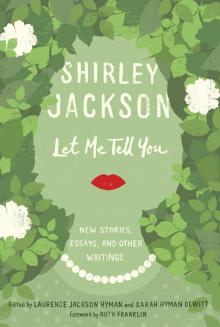 Let Me Tell You: New Stories, Essays, and Other Writings
Let Me Tell You: New Stories, Essays, and Other Writings The Haunting of Hill House
The Haunting of Hill House The Bird's Nest
The Bird's Nest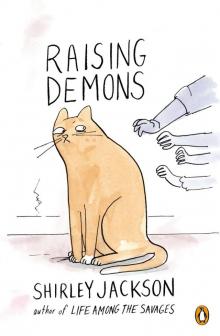 Raising Demons
Raising Demons We Have Always Lived in the Castle
We Have Always Lived in the Castle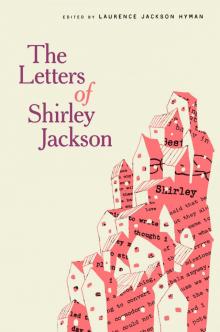 The Letters of Shirley Jackson
The Letters of Shirley Jackson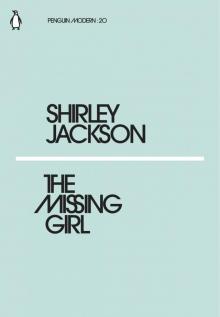 The Missing Girl
The Missing Girl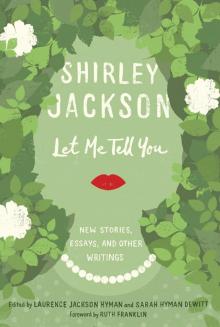 Let Me Tell You
Let Me Tell You